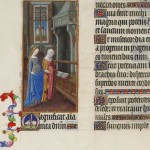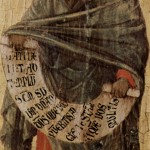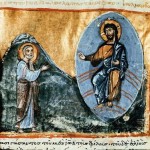
What It’s About: Hey, it’s a Zephaniah sighting! I love these texts from books we don’t see too often in the lectionary. When I was a kid, the minister of my church preached a sermon from 2 Macadoos (or something like that), the conclusion of which was to point out that most of the people in the congregation probably hadn’t realized that 2 Macadoos was a made-up book. In other words, it was a sermon about biblical illiteracy, and how much of the bible remains unknown to us.
Zephaniah is one of those books we don’t see very much, and if cornered, probably a lot of people wouldn’t be able to say whether it was really in the bible or not. But it is! So right off the bat, preaching on this text would be an opportunity to point out the gaps in our knowledge of sacred texts, and to start to fill those in.
What It’s Really About: This text is a joyful, confident one, quite in contrast to the typical prophetic texts of Advent, which tend to be filled with suffering and longing. This text is about the moment when things turn the corner, and start to get better. And it comes from one of the most critical moments in the history of Judah–the reign of king Josiah.
I always like to describe Josiah as the JFK of the ancient Israelites (well, Judahites in this case). It’s an extremely imperfect analogy, but it captures some of the dynamics of Josiah’s reign: he was a young comer, a change agent, but he also called the people back to traditional values. (He oversaw the “rediscovery,” or, more probably, the composition of the book of the law called Deuteronomy). His reign was full of promise and hopefulness, and full of meaningful change, but he died too young, leaving many of his reforms to founder. This text from Zephaniah, though, captures some of the hopeful spirit of the time, when there has been a deliverance from the nation’s enemies and security is once more at hand. This text is really about the sense of exhilaration that came from the nation having found deliverance from its enemies.
What It’s Not About: It’s odd, isn’t it, that we read texts about God’s past salvation of the people of God, to describe a future salvation of the people of God? Or maybe it’s not odd; maybe it’s right that we view the Jesus event in the context of God’s other saving acts across time. But we would be making a mistake to read this passage and assume that it is prophesying about the future; it is an in-the-moment celebration of God’s deliverance, not a look ahead to a future time of deliverance. So we should remember that as we read and preach it: this text belongs to a particular instance of God’s salvation, and it can help to describe another instance (the birth of Jesus). That’s exactly how the gospel writers thought, by the way: they saw Jesus in a tradition of God’s salvation-bringing. Jesus was hardly God’s first foray into saving.
Maybe You Should Think About: Who is the “you” of these verses? It has to be Judah, right? It’s not a general “you” in which I can include myself as a 21st century CE reader. So we always have to think about that. Think about the audiences that might have heard this text, and what it would have been saying to them.
What It’s About: This is a small section of Paul’s letter to the Philippians, from the near the end of the letter, where Paul is engaging in the kind of exhortations that were common to his letters, and returning to the theme of joy from earlier in the letter. He is trying to hold the Philippians up, while also giving them some goals to work toward.
What It’s Really About: This is here in the third Sunday of Advent, I assume, because of verse 5 part B: “The Lord is near.” Advent is a time of preparation for Jesus’ arrival, after all, and so this verse helps to ready us.
What It’s Not About: The more I learn about Paul’s letters, and the more I learn about the lectionary, the less I appreciate the way the letters are sometimes parceled out in the lectionary. This is a great example. This exhortation is taken out of context, and it really makes little sense divorced from the rest of the letter (or at least from the rest of the exhortation). Why are we reading this? What are we to take from it, aside from platitudes? Why is it in Advent?
Maybe You Should Think About: Verses 2-3, which immediately precede this passage, are far more interesting to me. I love it anytime Paul name-checks people–scholars call this “prosopography,” or in a very literal sense, the getting-to-know-people of the bible. Here are a couple of women, a man, and a collection of unnamed co-workers who Paul wants to mention by name. He does so between the exhortation on one side (which is directed in part at the two women), and a discussion of a “gift” he received from the community on the other. Let’s preach on that! I love prosopography.
What It’s About: This is a continuation of the apocalyptic theme we’ve seen lately. Here, the apocalypticism is mild, but still tangible. “The wrath to come” is a potent signifier, and readers can load into it whatever they like. For the hearers present at John’s saying it, though, the saying seemed to hit hardest on those with exploitative occupations. The tax collectors got nervous, because they were extorting people. The soldiers got nervous, because they were being dishonest and using their power wrongly. We hear this as a sort-of-apocalyptic text, but the people gathered there listening sure seemed to hear it as a full-fledged challenge.
What It’s Really About: This is really about John, and two things about him in particular. First, that he prepares the way for Jesus. And second, that he is not the messiah. This passage does both of those things. It has John foretelling a time of judgement. But it also has him flatly denying that he is the messiah, which is an important part of his role in the gospels. He is the chief challenger to Jesus’ role, but he is also the first (at least in the narrative) to step aside.
What It’s Not About: It’s not about John, but it’s also a little hard to wonder about John, based on this passage. What kind of figure was he? He was certainly interesting. He seemed to be preaching a Jesus-like message, but also a harsh message. Some have suggested that John was an Essene, and passages like this one certainly fit the stereotypes of that group. And you also get the sense that he had people hanging on his every word. No wonder the gospel writers are always at pains to say that John is simply a forerunner to Jesus–a warmup act for the main attraction. John was compelling on his own.
Maybe You Should Think About: Both the Zechariah and the gospel text say something about the environment into which Jesus was born. The Zechariah text is 600 years earlier, of course, but it still speaks to a geopolitical instability that never really went away. And this passage, in which someone who is not Jesus is saying lots of messianic and dramatic sounding things, gives us a sense of what was “in the water” a the time–an apocalyptic fervor, a messianic fervor, and a sense that things were about to change. And they were–in a lot of different ways.
















